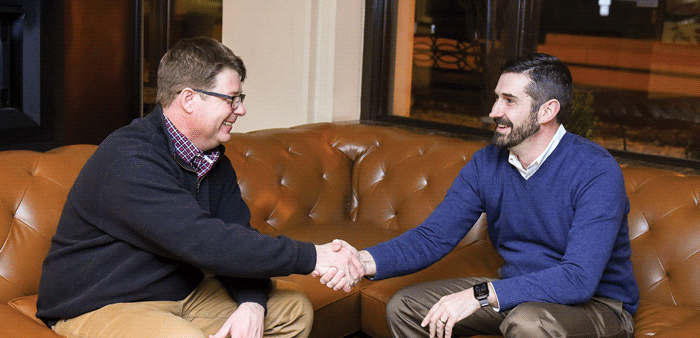Bryndon Meinhardt
Regional Manager,
KanEquip, Wamego, Kan.
Clint Schnoor
President,
Agri-Service, Kimberly, Idaho
Pictured Above: A passerby would never know that Clint Schnoor, (right, Agri-Service) and Bryndon Meinhardt (left, KanEquip) had never met before they sat down to talk in Louisville this winter. While their conversation took many twists and turns, the two shared their take on how the next generation of customers differs from the older generations in their buying habits and loyalties.
Clint Schnoor: What are you feeling as far as generational shift in farming and producers, and their loyalty to a brand? Do you see it changing or not?
Bryndon Meinhardt: I’m starting to see a change. Some of this may be fueled by the downturn in the farming market. Older producers are saying, “Why am I doing this? I’ve got a son back, let’s get him involved in the decision making.” The younger generation is less brand sensitive and more focused on solutions. Though they appreciate where a brand has gotten them to, they are willing to try new products and brands if they feel it will deliver more of a return or efficiently solve a problem. They just want solutions, and so I’m seeing some difference in Kansas on that.
“The generation that’s coming back almost all of them are educated and have more outside connections. They went to school with a friend that was doing this in another part of the country…”
– Bryndon Meinhardt
Schnoor: I believe that to be true as well. Because of technology, they’re going and researching a solution, and sometimes coming to the dealership with a preconceived idea of what you should deliver to them because of what they could find online. Then, I see that they are looking for a solution vs. saying “I’m going to buy this color, because that’s what we always did. That’s what we have always run.” They want to see the best thing out there.
With that in mind, do you see buyers in your geography going to one dealer or the next because they’re better at dealing with that? What I mean by that is, that they’re better at understanding what solution their machinery has for them, or their manufacturer has and that customer’s coming to ask for that.
Meinhardt: I’m seeing a shift in that there are dealers who are providing what I would call precision solutions, and there are dealers that aren’t. Today’s buyers are willing to make a shift and say, “If they’re not going to provide me the solution, I’m going to a dealer that does.”
Schnoor: OK.
Meinhardt: I’m seeing some of that. I think we’ll see more of it. The generation that’s coming back — almost all of them are educated and have more outside connections. They went to school with a friend that was doing this in another part of the country. They might have a dealer that they’re very close with, and connected with so they’re willing to even go there and get that technology sometimes. We’ve been seeing some of that.
“Because of technology, they’re going and researching a solution, and sometimes coming to the dealership with a preconceived idea of what you should deliver to them because of what they could find online…”
– Clint Schnoor
Schnoor: We see shifts in our market where they might be looking at another geography. Maybe it’s something the farmers in Kansas have done for years, but we’ve never done it in Idaho. Now that they are seeing those different types of things they’re ready to come apply those principles on our farm. Case in point, I had dinner the other night with a customer I would say is a very large producer, 50,000 acres that they have across their operation. It’s two gentlemen, they’re probably 60-65. I’m sitting at the table with the next generation. I’m talking to them about what they’re doing, and they said, “Oh yeah, we met this guy up in Canada when we were at a conference. We learned about the power tillers that he was using for the soil, and he was showing us the results of how much better they could grow potatoes and sugar beets. We put in an order and bought a whole bunch.” They actually bought 4 of these because they saw the practice up there, they saw them work. They ordered these power tillers in, and now they’re using them in that application. That would be considered absurd to most of our sugar beet and potato growers in southern Idaho. They’d say, “What are you doing?” But they’re willing to do that, where in the past they weren’t. I think that’s a shift from generation to generation; that they’re much more willing to adopt a new technology faster.
Meinhardt: And spend what I would say is large sums of money to do it. I mean, it’s not…
Schnoor: Yeah, that’s exactly right. It isn’t inexpensive machinery. They shelled out a lot of money to do this.
Meinhardt: That’s interesting to see, especially when you look globally. Farming practices vary around the world there’s a lot of technology out there that we don’t even think about.







